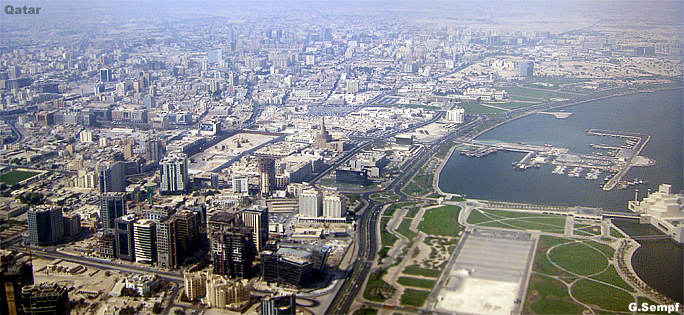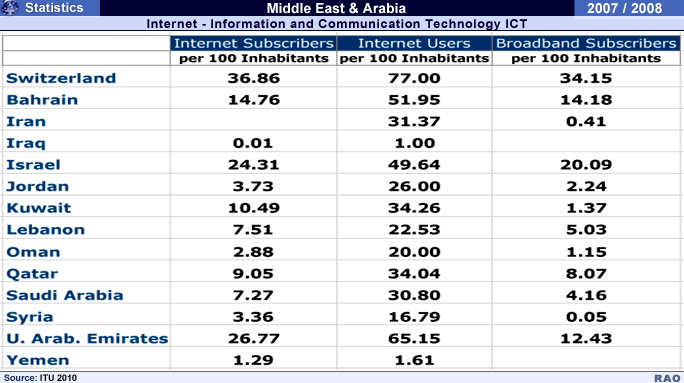|
Qatar
- The Country
|
 |
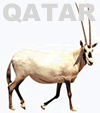 |
| A
peninsula on the western coast of the Arabian Gulf, Qatar is home to about
813 000 people.Despite its small size, it is a high-income economy with
a well-developed communications infrastructure.
Almost
half the country's population live in Qatar's capital and commercial centre,
Doha. In 2003, the per capita gross domestic product (GDP) was USD 28 920
- seventeenth in world rankings and higher than several members of the
"G8" group of industrialized countries. Petroleum and natural gas form
the basis of Qatar's economy, and at the end of 2004, they accounted for
almost 80 per cent of its total exports. |
|
|
ICT
infrastructure - Growth in ICT in Qatar
|
 |
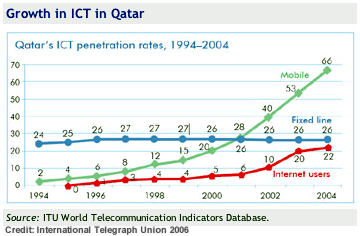 |
| The
expansion of information and communication technologies (ICT) in Qatar
has taken the country to a leading place in this field among its neighbours
in the region. It comes fourth in ICT penetration rates among the Arab
States, behind Bahrain, the United Arab Emirates and Kuwait. The incumbent
telecommunication operator, Qatar Telecom (Q-Tel), was partially privatized
in 1998, and the Supreme Council for Communication and Information Technology
(also known as ictQATAR) was created in 2004 with the mandate of regulator
and enabler of the country's ICT sector. |
|
Qatar
has seen particularly strong growth in the number of mobile phone subscribers,
which overtook the number of fixed telephone lines in 2001 (see chart).
The number of subscribers to mobile telephony services rose by an average
of 42 per cent per year between 1999 and 2004 - a considerably higher rate
than in most other countries in the region, or the world as a whole. By
the end of 2004, some 66 per cent of Qatar's population were subscribers
to mobile phone services. In contrast, the number of fixed telephone lines
has hardly changed over the last ten years. As in other countries, it seems
that people in Qatar are going straight to mobile telephony.
Internet
and broadband services are growing. Today, 22 per cent of Qatar's population
use the internet. By the end of 2004, Qatar had 10 652 broadband subscribers.
This was 6.5 per cent of internet users, and 1.4 per cent of the country's
population as a whole. Promoting broadband is one of the top priorities
of ictQATAR, which plans to establish and manage a "Broadband For All Access
Fund." The years to come are likely to see more broadband services in Qatar,
built upon what is already a solid foundation of ICT infrastructure and
new initiatives.
*World
Population Prospects: The 2004 Revision, Population Division of the Department
of Economic and Social Affairs of the United Nations Secretariat (2005).
top
|
Transforming
Qatar through ICT
|
 |
 |
 |
| As
information and communication technologies (ICT) increasingly pervade economic
and social activities, it becomes essential for countries to have an independent
authority to facilitate development and promote the interests of business
and the public at large. ictQATAR has been set up to put in place policies
and strategies that will shape the ICT environment and promote access for
all in Qatar and to coordinate the execution of initiatives.
Opening
eyes to the new world of information and knowledge through ICT. Children
in Qatar along with their teacher access the wealth of information available
online. / Source ictQatarMay 2005 saw the establishment of ictQATAR, or
the Supreme Council of Information and Communication Technology. Its mission
is to create an advanced information-based society to improve the life
of everyone in Qatar and to enhance the social and economic development
of the country. "Qatar aims to fully exploit ICT to become a world-leading
knowledge-based society," says Dr Hessa Al Jaber, Secretary-General of
ictQATAR." |
|
top
|
The
ictQATAR strategy
|
 |
Based
on international best practices, ictQATAR has adopted a comprehensive national
ICT strategic plan tailored specifically to the unique circumstances and
requirements of the country.
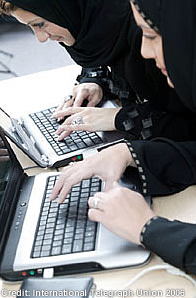 |
 Implementation
of the strategy brings together government agencies, ministries and the
private sector. The strategy aims at fostering an enabling environment
for ICT, increasing readiness, promoting the usage of ICT, monitoring progress
and prioritizing initiatives to achieve early results. Implementation
of the strategy brings together government agencies, ministries and the
private sector. The strategy aims at fostering an enabling environment
for ICT, increasing readiness, promoting the usage of ICT, monitoring progress
and prioritizing initiatives to achieve early results.
 ICT
use encourages equality for all. Women in Qatar working on computers. Source:
ictQatar ICT
use encourages equality for all. Women in Qatar working on computers. Source:
ictQatar
| ictQATAR's
key objectives |
 Foster
the environment Develop the market conditions, infrastructure
and supporting legal and regulatory frameworks that are most conducive
to ICT development. Foster
the environment Develop the market conditions, infrastructure
and supporting legal and regulatory frameworks that are most conducive
to ICT development.
 Increase
readiness Build awareness and reduce barriers to the use of ICT by
citizens, businesses and government agencies. Increase
readiness Build awareness and reduce barriers to the use of ICT by
citizens, businesses and government agencies.
Raise
usage Increase internet usage among citizens, businesses and government
agencies, through targeted government policies to provide incentives and
support the development of compelling content.
 Sustain
impact Continuously gauge progress, measure impact, and refine initiatives
accordingly. Sustain
impact Continuously gauge progress, measure impact, and refine initiatives
accordingly.
 Target
early results Prioritize initiatives and secure quick results to
sustain momentum and support. Target
early results Prioritize initiatives and secure quick results to
sustain momentum and support. |
|
 |
| The
ictQATAR strategy consists of 12 programmes: |
 |
State-of-the-art
infrastructure
This
programme aims to provide broadband connectivity for all, wireless neighbourhoods
and a world-class National Data Centre to provide the secure storage of
data that is essential to the ongoing success of business in the Information
Society.
Innovation
and capability building
The
objective of this programme is to foster ICT literacy through educational
projects. It also aims to stimulate the ICT job market and the development
of technology ventures, including research and development. Under the programme,
foreign ICT enterprises will be encouraged to open development centres
in Qatar.
Regulatory
and legal frameworks
The
purpose of this programme is to draft the regulatory and legal frameworks
required to govern a competitive market, while ensuring universal access.
Also under this programme, laws will be developed to protect privacy and
prevent cybercrime, and e-commerce regulations will be compiled to enable
secure transactions.
Local
content and multilingualism is critical for universal access to information
and knowledge. An Arabic keyboard used by Qataris.
Source
ictQatar, Safety and security
This
critically important programme covers the creation of a Computer Emergency
Response Team (CERT), with the mission of making Qatar a regional ICT security
hub. It also has the task of setting up emergency communications in support
of disaster relief operations.
Connected
citizens
Encouraging
the creation of interesting content and attractive online services is the
purpose of this programme. It also aims to connect more homes to high-speed
internet access and increase the number of computers and other access devices
in households.
Connected
business
This
programme will encourage small and medium-sized businesses to invest in
information systems, software and internet access. It will also promote
the use of ICT to make business processes more efficient.
Connected
government
To
enable the delivery of online data, information and services, this programme
seeks the deployment of a government-wide intranet.
top
|
e-Education
|
 |
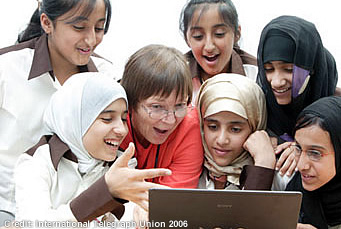 |
| Under
this programme, ictQATAR will promote and support opportunities
for the adoption of ICT into education by laying the ground for the development
of systems, training of resources and upgrading infrastructure across educational
institutions and for the community at large.
This
will be coupled by the development of standards and guidelines for ICT
in education to expedite and facilitate the creation of our knowledge communities. |
|
e-Health
This
programme will implement such projects as the Electronic Health Card, Electronic
Patient Network and the Integrated Healthcare Network connecting all healthcare
institutions and bodies.
e-Finance
This
programme focuses on ensuring the security and integrity of financial transactions,
the diversification of delivery channels for financial services, and the
deployment of electronic billing and payment systems.
e-Tourism
and sports
The
broadband internet connectivity of hotels, conference centres and other
public areas is to be improved under this programme. It will also make
high-quality mobile and wireless broadband available in sports facilities,
and develop services and applications such as high speed video streaming
and web hosting.
ICT
in other economic sectors
The
use of ICT in industries such as oil and gas will be promoted through this
programme, as well as the adoption of e-Procurement to streamline supply
chain management in day-to-day business and commerce for improved efficiency
and effectiveness.
ictQATAR is finalizing a comprehensive nation wide strategy for e-Education that
aims at enabling the population to use ICT to improve the quality of life
and contribute to the socio-economic development of the country. It focuses
on universalizing access to ICT and expanding the pool of resources and
opportunities while improving the quality of education to nurture a population
ready for competing in the information age. The strategy taps on providing
services to the education sector per se but extends to the over all community
while addressing the governmental needs and partnering with the corporate
private sector.
In
September 2005, ictQATAR initiated the first of many projects that translate
the objective of the e-Education strategy into tangible activities and
results. The Knowledge-Net initiative was launched to pilot the dissemination
of ICT as a platform for teaching, learning and communication in preparatory
and secondary schools, while building the capacity of the teaching body
to adopt ICT in their delivery of information. This endeavor, which entails
the development and implementation of a Learning Management System in schools,
will be rolled out nation wide as of September 2006. It is the first step
to the development of the national portal for education that focuses on
enhancing student's skills and awareness in ICT and its application in
the knowledge economy, preparing the community for the market demand, and
expanding the teaching professionals' capabilities and resources.
ictQATAR has also embarked on the development of the guidelines for ICT curriculum
to be adopted for the K-12 community, while it continuously coordinates
the ICT standards and requirements across all educational institutions
and ensure integration of ICT in the professional development of the education
professionals.
ictQATAR will also promote research and experimentation in the world's most advanced
technologies and will pilot opportunities for students to adopt, for example,
tablet PCs and PDAs as the core base of their learning experience wile
supporting e-curricula development and infrastructure upgrades.
top
|
Weitere Informationen
|
 |
top
|
Links
|
 |
|



